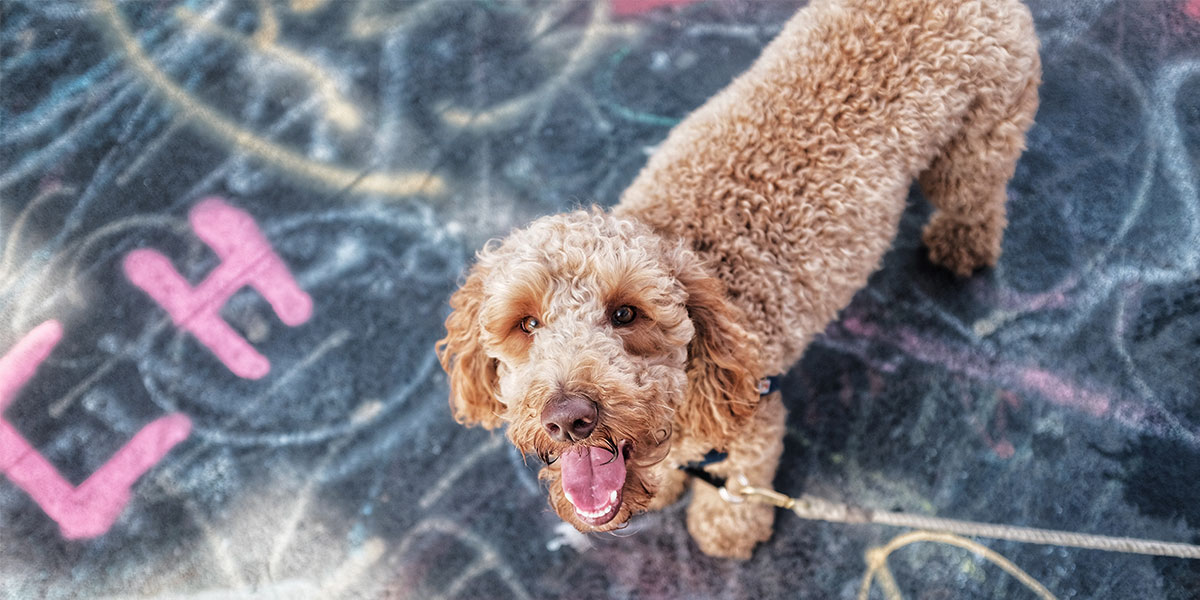Taking too long? Close loading screen.

March 7th
If you’ve spent any time around dogs, you’ve probably noticed that they like to lick themselves. A lot. And in most cases, this is healthy grooming behavior and should not be a cause for concern.
But sometimes excessive licking can be a sign of an underlying health problem. Here, we’ll show you what you should look out for if you are concerned that your dog’s licking is excessive.
Skin issues are one of the most common medical problems linked to excessive licking. If you notice that your dog keeps licking one area over and over, then that could be a sign that they are having problems with their skin.
There can be many different causes for skin issues. If you notice that your dog keeps licking their paws after they come back indoors, this could be an indication that they are having an allergic reaction to something in their environment. If you are using any lawncare products or sprays, keep your dog indoors to avoid any reaction.
Food is also another common allergen that can cause skin issues. Allergies from food may lead to itching all over your dog’s body, so the licking may not be limited to one area. Consider if you’ve made any recent changes in your dog’s diet, and make sure there are no toxic foods.
If you believe your dog may be having an allergic reaction to food, speak with your vet and discuss what your options are. They may suggest switching your dog to another food to see if the allergy goes away, or possibly giving your dog medication.
Fleas can cause more than scratching. Dogs will also lick the itchy areas, as well as areas that are sore from too much scratching. Check your dog for fleas. If you find them, you can speak to your vet, or look into the many different flea removal products.
Dogs will often lick areas that are in pain. If you notice that your dog is frequently licking the same spot, it could be a sign that they are suffering from an underlying health condition that is causing them pain.
Arthritis is often found in older dogs. If you notice that your dog is licking the areas around their joints, this could mean that they are suffering from pain related to arthritis. Your vet can help you manage your dog’s arthritis pain.
Licking may also be the sign of an infection. Inspect the area around where your dog is licking. If it appears inflamed, this could mean that the skin is infected. Call your vet, and get the infection treated before it spreads and causes more serious health problems.
If your dog keeps licking the area around its genitals, this could mean that they have a urinary tract infection. These can get quite serious if left untreated, so call your vet right away if you notice your dog licking and scratching these areas. They are usually fairly easy to treat, if they are caught early.
Dogs can also have impacted anal glands, which leads to them licking their rear. These glands produce a scent that is used by other dogs as a form of identity marker. When they are impacted, they can become quite painful for your dog. Speak to your vet if you notice your dog licking their rear excessively. Dealing with the problem is usually simple, but can be quite the mess. You can try to do it yourself after consulting with your vet, but you may be better off if your let them handle it.
Not all licking will be related to a medical problem. Sometimes there is a behavioral issue to blame. Dogs will often lick themselves if they are anxious. If you notice that your dog is licking too much, it may be that they are stressed. It could also be a sign that your dog has Obsessive Compulsive Disorder (OCD). If you notice these behaviors over time, consider using a calming natural remedy such as CBD oil. And speak to your vet about other ways you can treat your dog’s anxiety and keep them from engaging in harmful behaviors such as chewing.
Although licking can point to a more serious issue, don’t get too concerned. Most licking is healthy, and isn’t linked to any health or behavioral issues. Observe your dog for a few days and see if they are in any clear distress, and wait to see if the licking stops.
Don’t yet have the perfect puppy to worry over? Head to our puppy finder page to find your dream dog.
Find the Perfect Puppy